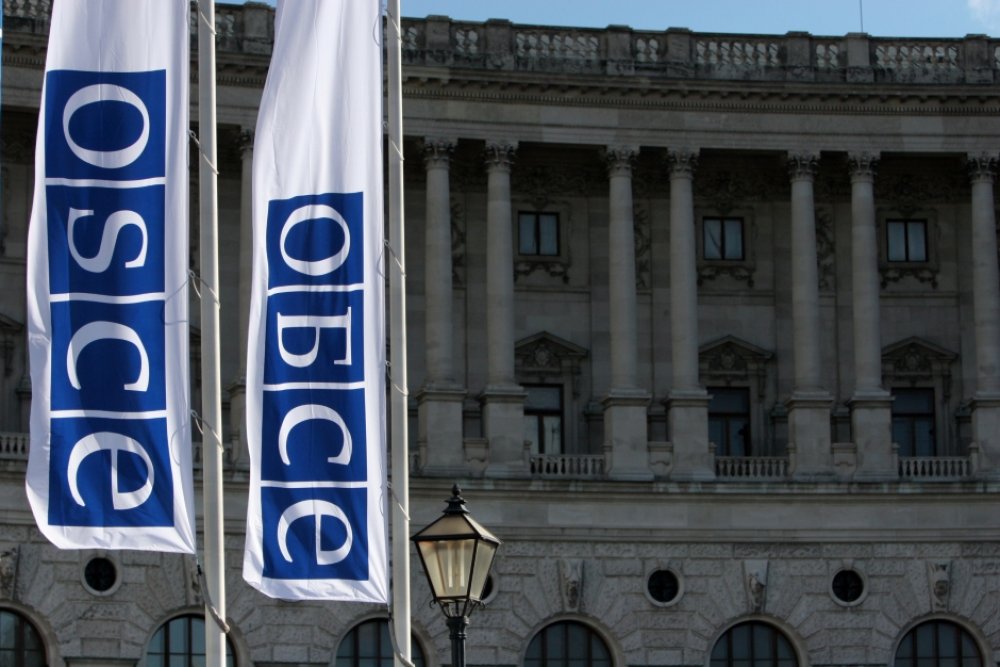The OSCE in 2030? Let’s First Survive the New Cold War
Where will the Organization for Security and Co-operation in Europe (OSCE) be in 2030, and can the Organization help to restore undivided security in Europe? That was the question that a panel of international experts tried to answer at the Austrian National Defense Academy in Vienna on March 6, 2018. The panel was moderated by Hannes Swoboda, former MEP and President of the International Institute for Peace. It was comprised of Thomas Greminger, OSCE Secretary General, Fyodor Lukyanov, prominent Russian columnist and Editor-in-Chief of ‘Russia in Global Affairs’, Alena Kupchyna, Ambassador of Belarus, and Stephanie Liechtenstein, Web Editor-in-Chief of the Security and Human Rights Monitor.
The beautiful premise of the late-baroque “Sala Terrana” provided for a fitting location, reminding the audience of the golden age of Austrian greatness, which is, as much as the OSCE’s golden days, long gone.
But what are the historical origins of the OSCE? Having barely survived the Cuban Missile Crisis, American and Soviet leaders decided in the late 1960s that it was time to add a significant portion of dialogue to the deterrence mix. Two documents laid down that vision which soon became known as détente: NATO’s 1967 Harmel Report (after then-Belgium Minister of Foreign Affairs, Pierre Harmel) and the 1975 Helsinki Decalogue of the Conference on Security and Co-operation in Europe (CSCE), a short statement of intent covering everything from military relations to human rights – or as Lukyanov quipped, an official recognition of mutual spheres of influence at that time.
Perhaps more importantly, the CSCE soon turned into the only multilateral forum for East-West talks. The hiatus of the renamed OSCE came with the end of the Cold War when participating States seriously debated how to stabilize European security through means of confidence-building, arms control, and peacekeeping missions. Once Washington had lost its interest in the Organization and Russia turned away from cooperation, things went down south in the OSCE as well. Thanks to Vladimir Putin and the war in Eastern Ukraine, the OSCE has regained some prominence as an inclusive forum for debate. The latest effort of the 57 participating States is to identify some common ground on military security under the unwieldy buzz word of the Structured Dialogue.
But what is the actual contribution of the OSCE to today’s security, aside from dialogue, and what could it be in twelve years from now? The new OSCE Secretary General, Swiss diplomat Thomas Greminger, started off by painting a rosy picture which included almost everything from successful disarmament and gender equality to better inter-human behavior and clean air. His utopian vision came across more as a deliberate counter-narrative to the currently poor state of European security.
Perhaps, Lukyanov was not in the mood for this fine-tuned form of Swiss irony and instead poured out doom and gloom. In one of his more remarkable comments he reminded the audience that now, after Washington has also officially named Russia a “strategic competitor” and “revisionist power” in its latest official documents, and after Vladimir Putin’s effect-seeking missile show, “we are really in a New Cold War” – and perhaps one that is even less stable than its predecessor. Lukyanov made it clear that he doesn’t count on the Europeans to diffuse tensions. For Russia, the Europeans do not matter strategically, he extrapolated, adding that this might change in the future but, historically seen, European empowerment never meant anything good for Russia. At that point, the well-known Russian commentator almost sounded as if he welcomed the New Cold War as long as Washington stays engaged in NATO and as long as both sides do what they are historically familiar with: deterring each other and, if necessary, engaging in arms racing.
So where is the OSCE in all that? It was up to the two women on the panel to pose the necessary critical questions about the enduring relevance of the Organization. Ambassador Alena Kupchyna, Permanent Representative of Belarus to the OSCE, reminded the audience that there has never been any “indivisible security in Europe” and that states markedly disagree about what that even means. Stephanie Liechtenstein, perhaps the only journalist worldwide to constantly cover the proceedings of the OSCE, took up that point and correctly observed that the current negative security trend in Europe is only but a symptom of the deeper crisis of the Euro-Atlantic security order – a crisis that dates back to the late 1990s. She also stressed that Organizations such as the OSCE could play a much greater role in the maintenance of Euro-Atlantic security if the international community invested more money in them. Spending more money on conflict prevention and not only focusing on defense spending could make a real difference, she added.
Fortunately, the panelists found common ground when stressing the value of the Structured Dialogue. As much as strategists in Moscow or Washington might overlook this European-led effort to break the vicious cycle in East-West relations, the Structured Dialogue is currently the only forum with a somewhat forward-looking agenda.
The Structured Dialogue discusses exactly those factors that fuel the New Cold War: mutual threat perceptions, lack of transparency and predictability, ambiguous force postures, and dangerous military incidents. Whether it will yield any palatable results in the coming years is an open question; so far, discussing these issues is a success in itself. But if the OSCE wants to stay relevant until and after 2030 its participating States better give it a chance. If we survive the New Cold War, it will hopefully also be thanks to the OSCE.
Ulrich Kühn is a Senior Research Associate at the Vienna Center for Disarmament and Non-Proliferation (VCDNP) and a Nonresident Scholar with the Carnegie Endowment for International Peace.



Comments
* Your email address will not be published